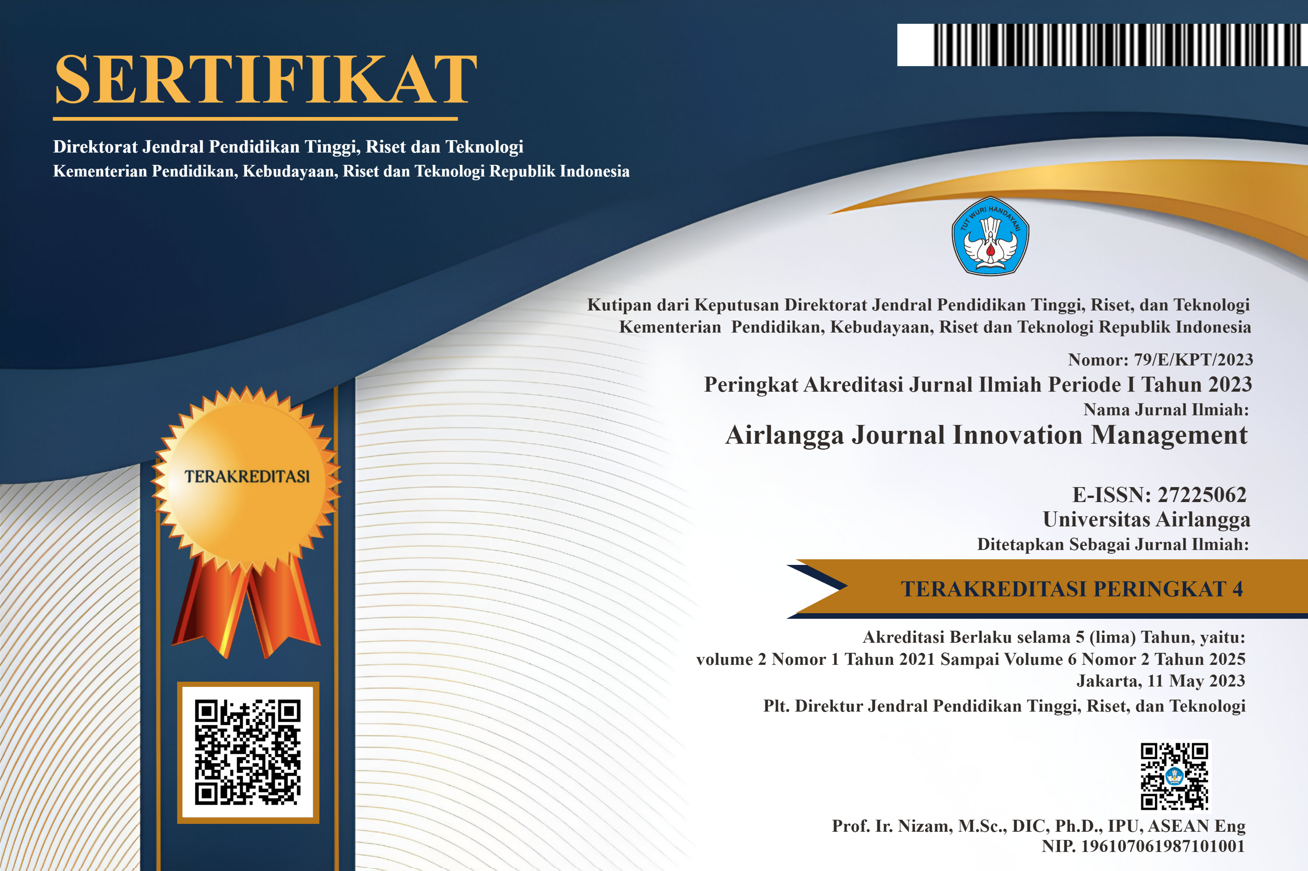The Influence of Women Entrepreneurial Leadership on Employee Performance with Innovative Work Behavior as an Intervening
Downloads
Employee performance is an important element that plays a role in determining the success of an organization, because the achievement of goals and the company's competitiveness are highly dependent on the quality and productivity of employees. Along with increasing competition in the global market, companies must understand and identify factors that can optimize employee performance, both in terms of motivation, leadership, and work environment. The importance of women's leadership in the business world is getting more attention, especially in the context of diversity and inclusion. This study aims to analyze the effect of women's entrepreneurial leadership on employee performance through innovative work behavior. This study uses a quantitative approach. The data collection method in this research is observation and a questionnaire. The analytical tool used is SEM PLS 4. The population subjects in this study were employees at SME of Sari Murni, Tulungagung, totaling 40 people. In the sampling technique in this study. The result of this study found that women's entrepreneurial leadership has a significant effect on employee performance. Women's entrepreneurial leadership has a significant effect on innovative work behavior. Innovative work behavior has no significant effect on employee performance. Innovative work behavior is not able to mediate the relationship between women's entrepreneurial leadership on employee performance
Advancing Women in Leadership (DOJ). (2024). Federal Grants & Contracts, 48(3). https://doi.org/10.1002/fgc.33454
Alkhaled, S., & Berglund, K. (2018). ‘And now I’m free’: Women’s empowerment and emancipation through entrepreneurship in Saudi Arabia and Sweden. Entrepreneurship and Regional Development, 30(7–8), 877–900. https://doi.org/10.1080/08985626.2018.1500645
Alvarez, S. A., & Barney, J. B. (2008). Resource-Based Theory and the Entrepreneurial Firm. Strategic Entrepreneurship: Creating a New Mindset, 89–105. https://doi.org/10.1002/9781405164085.ch5
Aparisi-Torrijo, S., & Ribes-Giner, G. (2022a). Female entrepreneurial leadership factors. In International Entrepreneurship and Management Journal (Vol. 18, Issue 4). https://doi.org/10.1007/s11365-022-00798-2
Aparisi-Torrijo, S., & Ribes-Giner, G. (2022b). Female entrepreneurial leadership factors. International Entrepreneurship and Management Journal, 18(4), 1707–1737. https://doi.org/10.1007/s11365-022-00798-2
Asfiah, N., Anshori, M., & Mawardi, I. (2018). An Analysis of Women's Empowerment in Micro Business with Social Entrepreneurship Concept. 231(Amca), 67–70. https://doi.org/10.2991/amca-18.2018.19
Bernardin, H. J., & Russell, J. E. A. (2007). Human resource management: An experiential approach. Mc Graw-Hill, Inc.
Danisman, S., Tosuntas, S. B., & Karada, E. (2015a). The Effect of Leadership on Organizational Performance. International Publishing Switzerland, 1(1), 143–168. https://doi.org/10.1007/978-3-319-14908-0
Danisman, S., Tosuntas, S. B., & Karada, E. (2015b). The Effect of Leadership on Organizational Performance. International Publishing Switzerland, 1(1), 143–168. https://doi.org/10.1007/978-3-319-14908-0
Danişman, Ş., Tosuntaş, Ş. B., & Karadağ, E. (2015). The effect of leadership on organizational performance. Leadership and Organizational Outcomes: Meta-Analysis of Empirical Studies, 1(1), 143–168. https://doi.org/10.1007/978-3-319-14908-0_9
De Jong, J., & Den Hartog, D. (2010a). Measuring innovative work behaviour. Creativity and Innovation Management, 19(1), 23–36. https://doi.org/10.1111/j.1467-8691.2010.00547.x
De Jong, J., & Den Hartog, D. (2010b). Measuring innovative work behaviour. Creativity and Innovation Management, 19(1), 23–36. https://doi.org/10.1111/j.1467-8691.2010.00547.x
De Jong, J., & Den Hartog, D. (2010c). Measuring Innovative Work Behaviour. Creativity and Innovation Management.
De Jong, J., & Kemp, R. (2003). Determinants Of Co-Workers’s Innovative Behaviour. An in Investigation Into Knowledge Intensive Service.” International Journal of Innovation 4 Management. (Vol. 7).
Dellby, C., Aam, I., & Rusydiana, S. (2024). Understanding the Drivers of Consumer Loyalty Among Millennials Towards Halal Restaurants in Indonesia : SEM – PLS Analysis. 5(3), 379–395.
Diamantidis, A. D., & Chatzoglou, P. (2019). Factors affecting employee performance: an empirical approach. International Journal of Productivity and Performance Management, 68(1), 171–193. https://doi.org/10.1108/IJPPM-01-2018-0012
Don Y., L., & Erick W., K. T. (2001). The Effects of Entrepreneurial Personality, Background and Network Activities on Venture Growth. Journal of Management Studies, 38(4), 583–602.
Eiriz, V., & Castro, L. (2007). Women and Entrepreneurship: Contemporary Classics. International Entrepreneurship and Management Journal, 3, 345–347. https://doi.org/10.1007/s11365-007-0051-2
Farhan, B. Y. (2022). Women leadership effectiveness: competitive factors and subjective and objective qualities. Cogent Social Sciences, 8(1). https://doi.org/10.1080/23311886.2022.2140513
Fitrio, T., Budiyanto, & Agustedi. (2020a). The rule of organizational citizenship behavior and innovative work behavior in mediating the influence of organizational commitment and culture to employee performance. Accounting, 6(7), 1351–1360. https://doi.org/10.5267/j.ac.2020.8.014
Fitrio, T., Budiyanto, & Agustedi. (2020b). The rule of organizational citizenship behavior and innovative work behavior in mediating the influence of organizational commitment and culture to employee performance. Accounting, 6(7), 1351–1360. https://doi.org/10.5267/j.ac.2020.8.014
Gupta, V. K., Turban, D. B., & Pareek, A. (2013). Differences Between Men and Women in Opportunity Evaluation as a Function of Gender Stereotypes and Stereotype Activation. Entrepreneurship: Theory and Practice, 37(4), 771–788. https://doi.org/10.1111/j.1540-6520.2012.00512.x
Hartono, R. (2021). Kepemimpinan Perempuan di Era Globalisasi. Jurnal Pancasila Dan Kewarganegaraan, 1(1), 82–99.
Herlina, E., Tukiran, M., & Anwar, S. (2021a). THE EFFECT OF ENTREPRENEURIAL LEADERSHIP ON ORGANIZATIONAL PERFORMANCE: LITERATURE REVIEW. In JOURNAL OF MANAGEMENT, ACCOUNTING, GENERAL FINANCE AND INTERNATIONAL ECONOMIC ISSUES (MARGINAL) (Vol. 1, Issue 1). https://ojs.transpublika.com/index.php/MARGINAL/
Herlina, E., Tukiran, M., & Anwar, S. (2021b). The Effect of Entrepreneurial Leadership on Organizational Performance: Literature Review. Journal of Management, Accounting, General Finance and International Economic Issues (Marginal), 1(1), 25–33. https://doi.org/10.1007/978-3-319-14908-0_9
Herlina, E., Tukiran, M., & Anwar, S. (2021c). The Effect of Entrepreneurial Leadership on Organizational Performance: Literature Review. Journal of Management, Accounting, General Finance and International Economic Issues (Marginal), 1(1), 25–33. https://doi.org/10.1007/978-3-319-14908-0_9
Hikmah Perkasa, D., & Abadi, F. (2020). under a Creative Commons Attribution (CC-BY-NC-SA) 4.0 license. JRMB) FakultasEkonomi UNIAT, 5(2), 15–28. http://jrmb.ejournal-feuniat.net/index.php/JRMB/article/view/358
Jing, Z., Hou, Q., Zhang, Y., & Zhao, Y. (2022a). The Relationship between Female Leadership Traits and Employee Innovation Performance—The Mediating Role of Knowledge Sharing. Sustainability, 14(11). https://doi.org/10.3390/su14116739
Jing, Z., Hou, Q., Zhang, Y., & Zhao, Y. (2022b). The Relationship between Female Leadership Traits and Employee Innovation Performance—The Mediating Role of Knowledge Sharing. Sustainability (Switzerland), 14(11). https://doi.org/10.3390/su14116739
Kourtesopoulou, A., & Chatzigianni, E. E. (2021a). Gender Equality and Women’s Entrepreneurial Leadership in Tourism: A Systematic Review. Gender and Tourism: Challenges and Entrepreneurial Opportunities, September, 11–36. https://doi.org/10.1108/978-1-80117-322-320211002
Kourtesopoulou, A., & Chatzigianni, E. E. (2021b). Gender Equality and Women’s Entrepreneurial Leadership in Tourism: A Systematic Review. In Gender and Tourism: Challenges and Entrepreneurial Opportunities (pp. 11–36). Emerald Group Publishing Ltd. https://doi.org/10.1108/978-1-80117-322-320211002
Li, C., Makhdoom, H. U. R., & Asim, S. (2020a). Impact of entrepreneurial leadership on innovative work behavior: Examining mediation and moderation mechanisms. Psychology Research and Behavior Management, 13, 105–118. https://doi.org/10.2147/PRBM.S236876
Li, C., Makhdoom, H. U. R., & Asim, S. (2020b). Impact of entrepreneurial leadership on innovative work behavior: Examining mediation and moderation mechanisms. Psychology Research and Behavior Management, 13, 105–118. https://doi.org/10.2147/PRBM.S236876
Musoli. (2021a). Peran Kepemimpinan Perempuan, Motivasi dan Disiplin Kerja dalam Meningkatkan Kinerja Karyawan. JPIM (Jurnal Penelitian Ilmu Manajemen), 6(1), 64–88.
Musoli. (2021b). Peran kepemimpinan perempuan, motivasi dan disiplin kerja dalam meningkatkan kinerja karyawan. JPIM (Jurnal Penelitian Ilmu Manajemen), 6(1), 64–88.
Perkasa, D. H., & Abadi, F. (2020). Under a Creative Commons Attribution (CC-BY-NC-SA) 4.0 license. JRMB FakultasEkonomi UNIAT, 5(2), 15–28.
Pinela, N., Guevara, R., & Armijos, M. (2022). Entrepreneurial Leadership, Work Engagement, and Innovative Work Behavior: The Moderating Role of Gender. In International Journal of Economics and Business Administration: Vol. X (Issue 2).
Pradana, E. R., & Suhariadi, F. (2020). The Effect Of Job Crafting On Innovative Behavior Through. Airlangga Journal of Indonesian Management, 1(1), 77–91.
Prawirosentono, S., & Primasari, D. (2015). Manajemen Sumberdaya Manusia Kinerja & Motivasi Karyawan: Membangun Organisasi Kompetitif Era Perdagangan Bebas Dunia. BPFE.
Rahayu Ghozali, A., & Hadi, C. (n.d.). Hubungan antara Leader Member Exchange dengan Innovative Work Behavior pada Karyawan Industri Pariwisata. http://e-journal.unair.ac.id/index.php/BRPKM
Reynal, I., Piki, M., Ardimi, M. G., Suwandi, C. I., & Ferdinan, B. A. (2023a). Pengaruh Kepemimpinan Entreprenurial dan Budaya Organisasional Terhadap Kinerja Karyawan Melalui Perilaku Kerja Inovatif di Jakarta. Widya Cipta: Jurnal Sekretari Dan Manajemen, 7(1), 45–52. https://doi.org/10.31294/widyacipta.v7i1.15153
Reynal, I., Piki, M., Ardimi, M. G., Suwandi, C. I., & Ferdinan, B. A. (2023b). Pengaruh Kepemimpinan Entreprenurial dan Budaya Organisasional Terhadap Kinerja Karyawan Melalui Perilaku Kerja Inovatif di Jakarta. Widya Cipta: Jurnal Sekretari Dan Manajemen, 7(1), 45–52. https://doi.org/10.31294/widyacipta.v7i1.15153
Robbins, S. P., & Judge, T. A. (2016). Organizational Behavior. Pearson.
Sanusi, F. (2011). Dibyantoro (2022) Improving Employee Performance Through Innovative Work Behavior. 7(5).
Sanusi, F., & Dibyantoro. (2022a). Improving Employee Performance Through Innovative Work Behavior. Syntax Literate: Jurnal Ilmiah Indonesia, 7(5), 5189–5202.
Sanusi, F., & Dibyantoro. (2022b). Improving Employee Performance Through Innovative Work Behavior. Syntax Literate: Jurnal Ilmiah Indonesia, 7(5), 5189–5202.
Siraj, N., & Hágen, I. (2023a). Performance management system and its role for employee performance: Evidence from Ethiopian SMEs. Heliyon, 9(11). https://doi.org/10.1016/j.heliyon.2023.e21819
Siraj, N., & Hágen, I. (2023b). Performance management system and its role for employee performance: Evidence from Ethiopian SMEs. Heliyon, 9(11). https://doi.org/10.1016/j.heliyon.2023.e21819
Sugiyono, & Lestari, P. (2021). Metode Penelitian Komunikasi. Alfabeta.
Wells, K., & Fleshman, J. W. (2020). Women in Leadership. Clinics in Colon and Rectal Surgery, 33(4). https://doi.org/10.1055/s-0040-1712977
Copyright (c) 2025 Airlangga Journal of Innovation Management

This work is licensed under a Creative Commons Attribution-NonCommercial-ShareAlike 4.0 International License.
- The journal allows authors to hold copyright without restrictions and retain publication rights without restrictions. The author retains the copyright and grants the first publication rights to the journal, with his work simultaneously licensed under the Creative Commons Attribution-NonCommercial-ShareAlike 4.0 International License (CC BY-NC-SA). This license allows others to share the work with acknowledgment of authorship and initial publication in this journal, provided that the work is not used for commercial purposes and that any derivative works must use the same license.
- Authors may enter into additional contractual agreements for non-exclusive distribution of the journal publication version (e.g., uploading it to an institutional repository or publishing it in book form), while still including acknowledgment of the initial publication in this journal.
- Authors are allowed and encouraged to upload their work online (e.g., in an institutional repository or personal website) before and during the submission process. This can support productive scientific exchanges as well as increase citations to published works.

AJIM by UNAIR is licensed under a Creative Commons Attribution-NonCommercial-ShareAlike 4.0 International License.





















